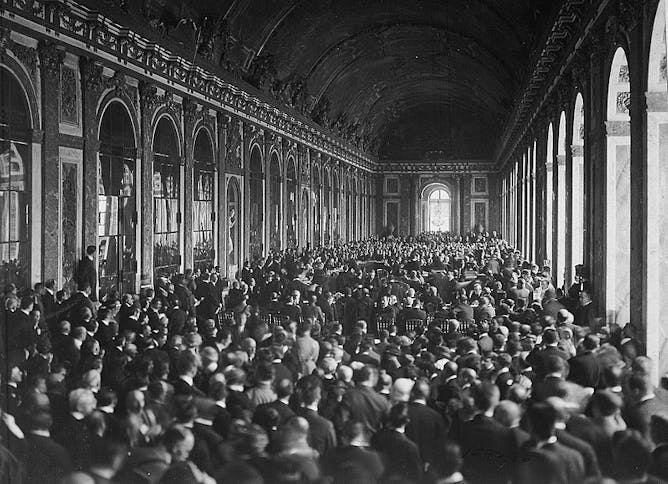|
|
|
Editor's note
|
|
As the world prepares to mark the centenary of the Armistice that brought World War I to a close, we’ve dedicated our latest episode of The Anthill podcast to the Great War. Hear a sneak preview of a piece of music commissioned for a special concert this Sunday, and find out what happened to the men who refused to fight – both in Britain and Germany. Meanwhile, as part of our ongoing coverage of the World War I centenary, you can read about whether it’s fair to blame the Treaty of Versailles for the rise of
Hitler, and how the Irish settlement is a legacy of the conflict that’s often ignored.
We’d love to hear your feedback on The Anthill podcast too. If you can spare a few minutes to fill in our listener survey, we’d be most grateful.
The health secretary, Matt Hancock, wants us to consume less salt, citing research which shows that reducing our intake from 8g a day (the current average intake) to 6g would prevent 8,000 premature deaths each year. The problem is, food without salt is bland. Fortunately, scientists are working on ways to trick the brain into perceiving saltiness, without using salt. Jane Parker explains how.
Doctors should be prescribing trips to museums and music playlists as well as pills, the health secretary has also said. This may sound absurd, but it’s far from it. According to Paul Crawford, such plans don’t go far enough. He argues that the health benefits of the arts are so great that they should be considered a shadow health service, and funded as such.
|
Gemma Ware
Society Editor
|

|
|
Top stories
|

shutterstock.
Annabel Bligh, The Conversation; Gemma Ware, The Conversation; Jane Wright, The Conversation
A podcast on World War I – from a meeting between the three great war poets, to what happened to conscientious objectors in both Britain and Germany.
|

The delegations signing the Treaty of Versailles in the Hall of Mirrors.
Helen Johns Kirtland (1890-1979) and Lucian Swift Kirtland (died 1965), US National Archives
Steven Woodbridge, Kingston University
The Treaty of Versailles is often named as the main cause of World War II. But this is an overly simple explanation.
|

judoman/Shutterstock
Jane Parker, University of Reading
Scientists have found ways to trick the brain into thinking you're tasting salt.
|

Mike Orlov/Shutterstock.com
Paul Crawford, University of Nottingham
Dancing, drumming, visiting galleries and so on are one of the best ways of enhancing public health.
|
Politics + Society
|
-
Gwilym Pryce, University of Sheffield; Meng Le Zhang, University of Sheffield
Scotland tends to take a more progressive approach to inequality, but how is it actually faring compared to the rest of the UK?
-
Marie Coleman, Queen's University Belfast
The events of the war caused Irish nationalists to push harder for their independence.
-
Scott Lucas, University of Birmingham
The Democrats took the House of Representatives, but uncertainty remains and Trump is still standing. All eyes are now on Robert Mueller.
-
Jennifer Mathers, Aberystwyth University
Several states now have their first female senator and more than 100 women will enter the House of Representatives.
|
|
Environment + Energy
|
-
Steven Huckle, University of Sussex
Bitcoin may have a large carbon footprint, but cleaner digital currencies aren't going to prevent an environmental disaster.
-
Jeroen Minderman, University of Stirling
A new study claims that wind turbines kill enough birds of prey that they are effectively an 'apex predator'.
|
|
Science + Technology
|
-
Matthew Slater, Staffordshire University; Martin J Turner, Staffordshire University
It matters whether you feel like your boss cares about you.
-
Christian Yates, University of Bath
The man who conceived the computer and helped crack the Nazi Enigma code deserves national recognition.
|
|
Cities
|
-
Julian Manley, University of Central Lancashire
Four factors led to positive change that was part planned, part felicitous – but the Preston model is already catching on across the nation.
|
|
Business + Economy
|
-
Sam Power, University of Exeter
Brexit campaigner Arron Banks faces a criminal inquiry for £8m of funds he donated to the Leave campaign.
|
|
Health + Medicine
|
-
Benjamin Rosser, Liverpool John Moores University
Could you treat depression, anxiety and other disorders by training people to be better at dealing with uncertainty? Scientists are trying to find out.
|
|
| |
Featured events
|

|
Room PZA/103, Piazza Building, Campus East, York, York, YO10 5GE, United Kingdom — University of York
|

|
Room SLB/118, Spring Lane Building, York, York, YO10 5DD, United Kingdom — University of York
|

|
Museum of English Rural Life, Redlands Road,, Reading, Reading, RG1 5EX, United Kingdom — University of Reading
|

|
Aston University, The Aston Triangle, Birmingham, Birmingham, B4 7ET, United Kingdom — Aston University
|
|
|
|
| |
| |
| |
| |
| |
|
|
|
|
|
|
|